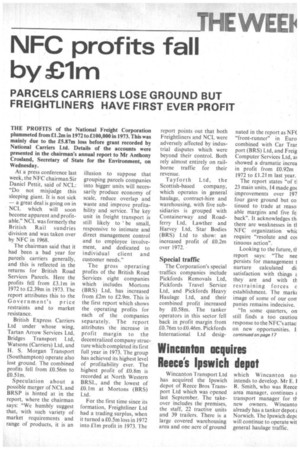NFC profits fall by Lim
Page 15

If you've noticed an error in this article please click here to report it so we can fix it.
PARCELS CARRIERS LOSE GROUND BUT FREIGHTLINERS HAVE FIRST EVER PROFIT
THE PROFITS of the National Freight Corporation plummeted from £1.2m in 1972 to £100,000 in 1973. This was mainly due to the £5.87m loss before grant recorded by National Carriers Ltd. Details of the accounts were presented in the chairman's annual report to Mr Anthony Crosland, Secretary of State for the Environment, on Wednesday.
At a press conference last week, the NFC chairman Sir Daniel Pettit, said of NCL: "Do not misjudge this sleeping giant. It is not sick — a great deal is going on in NCL which will soon become apparent and profitable." NCL was formerly the British Rail sundries 'division and was taken over by NFC in 1968.
The chairman said that it had been a bad year for parcels carriers generally, and this is reflected in the returns for British Road Services Parcels. Here the profits fell from £3.1m in 1972 to £2.39m in 1973. The report attributes this to the Government's price restraints and to market resistance.
British Express Carriers Ltd under whose wing, Tartan Arrow Services Ltd, Bridges Transport Ltd, Watsons (Carriers) Ltd, and H. S. Morgan Transport (Southampton) operate also lost ground. The combined profits fell from £0.56m to £0.51m.
Speculation about a possible merger of NCL and BRSP is hinted at in the report, where the chairman says: "We humbly suggest that, with such variety of market requirements and range of products, it is an illusion to suppose that grouping parcels companies into bigger units will necessarily produce economy of scale, reduce overlap and waste and improve profitability and service. The key unit in freight transport is still likely to ' be small, responsive to intimate and direct management control and to employee involvement, and dedicated to individual client and customer needs."
The gross operating profits of the British Road Services eight companies which includes Mortons (BRS) Ltd, has increased from £2m to £2.9m. This is the first report which shows the operating profits for each of the companies separately. The report attributes the increase in profit margin to the decentralized company structure which completed its first full year in 1973. The group has achieved its highest level of profitability ever. The highest profit of £0.8m is recorded at North Western BRSL, and the lowest of £0.1m at Mortons (BRS) Ltd.
For the first time since its formation, Freightliner Ltd had a trading surplus, when it turned a £0.5m loss in 1972 into Elm profit in 1973. The report points out that both Freightliners and NCL were adversely affected by industrial disputes which were beyond their control. Both rely almost entirely on railborne traffic for their revenue.
Tayforth Ltd, the Scottish-based company, which operates in general haulage, contract-hire and warehousing, with five subsidiaries is grouped with Containerway and Roadferry Ltd, Lawther and Harvey Ltd, Star Bodies (BRS) Ltd to show: an increased profit of £0.2m over 1972.
Special traffic The Corporation's special • traffics companies include Pickfords Removals Ltd, Pickfords Travel Service Ltd, and Pickfords Heavy Haulage Ltd, and their combined profit increased by £0.58m. The tanker operators in this sector fell back in profit margin from £0.76m to £0.46m. Pickfords International Ltd desig nated in the report as NFC "front-runner" in Euro combined with Car Trar port (BRS) Ltd, and Freig Computer Services Ltd, ai showed a dramatic increa in profit from £0.92m 1972 to £.1.21m last year.
The report states "of ti 23 main units, 14 made go( improvements over 197 four gave ground but co tinued to trade at reaso able margins and five fe, back". It acknowledges th, there are weaknesses in ti NFC organization whic require "resolute and coi tinuous action".
Looking to the future, ti report says: "The nee persists for management t nurture calculated di: satisfaction with things they are and with th restraining forces c establishment. The mark( image of some of our COff panics remains indecisive.
"In some quarters, on still finds a too cautiou response to the NFC's attac on new opportunities. 1.








































































































